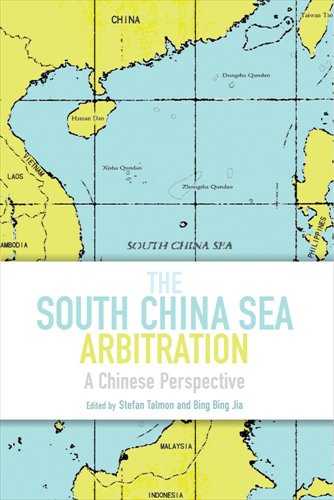HOME >> OP-ED
Sino-Philippine disputes better settled by honest talks than lawsuits
Source:Global Times Published: 2014-3-6 20:03:01

Stefan Talmon & Bing Bing Jia, eds, The South China Sea Arbitration - A Chinese Perspective, Hart Publishing, February 2014
By virtue of its position, the South China Sea forms part of a vital route for maritime trade and transport for East Asian and Southeast Asian countries and their trading partners in Asia, Africa and beyond, which gives this area great geopolitical significance. Therefore, disputes over regional control and influence among the littoral states are bound to arise.The Philippines has played quite an extensive role in making claims over territorial sovereignty in the South China Sea. On January 22 2013, it instituted arbitral proceedings against China under the United Nations Convention on the Law of the Sea (UNCLOS) with regard to disputes between the two countries in the South China Sea.
The South China Sea Arbitration - A Chinese Perspective, edited by Stefan Talmon, professor of Public International Law and director at the Institute for Public International Law at the University of Bonn and Bing Bing Jia, professor of International Law at the Tsinghua University Law School, centers on this international law case.
Books on important international law cases are normal, but this one rises above the others due to its focuses on various parties involved, the legal questions to be decided and the absence of one of the parties.
China has declared that it will not have any part in the arbitral proceedings instituted by the Philippines under UNCLOS with regard to disputes in the South China Sea. The book not only analyzes the motivations of the Philippines, but also attaches importance to China's attitude despite its rejection to the arbitration request.
The Philippines floated the idea of submitting its disputes with China over entitlements in the South China Sea to adjudication, but the book reviews this "confrontational approach" from the perspective of the "politics of arbitration," drawing the conclusion that it may be questioned whether such acts will "really contribute to achieving peace, security and regional stability."
Through such actions, the Philippines has portrayed itself as a champion of "the peaceful settlement of disputes" and put the blame for the failure to reach a negotiated settlement squarely at the door of China, so as to gain an easy excuse for not continuing bilateral negotiations.
The book argues that the 13 points of the "Relief Sought" by the Philippines have neither "given rise to a dispute concerning the interpretation or application of the Convention" nor can these points be "addressed without considering matters which are or have been validly removed from the jurisdiction of the Tribunal." Hence, China's non-participation in the proceedings becomes easily understandable.
After analyzing the validity of China's default of appearance in this case, the book also examines why it happens. In the latter part, China's reasons for refusing the arbitration request are explained: The request fails to fulfill in good faith legal obligations under UNCLOS, serious legal flaws exist in the notification and statement of claim, and it breaches numerous declarations and bilateral agreements.
Based upon the mentioned above, the book suggests that the Tribunal, established to hear the case brought by the Philippines against China, would be well advised to refer the disputes back to the parties for them to reach a negotiated settlement.
The book offers a balanced Chinese perspective on some of the issues to be decided by the Tribunal, showing that there are insurmountable preliminary objections to the Tribunal deciding the case on the merits, and that it should be referred back to the parties so they can reach a negotiated settlement.
There has been no conclusive proof as to the failure of negotiations, according to the book, which leaves enough room for a peaceful settlement as the best way out of the current confrontations between the two parties to the disputes.
Posted in: Fresh off the Shelf